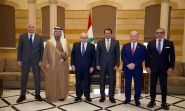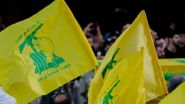
Prime Minister Nawaf Salam announced on Friday that the Lebanese government was moving forward with the plan to disarm Hezbollah. He stressed that Lebanon’s fragile state institutions and army will require significant international support to implement the plan successfully.
Salam highlighted the urgent financial needs of the country, citing the World Bank’s estimate that Lebanon requires at least $14 billion for post-war reconstruction. In addition, the Lebanese army needs equipment and funding to take control of areas previously dominated by Hezbollah, as outlined in the ceasefire agreement with Israel. He called on both Western and Arab countries to provide immediate assistance. “We need support for the army in terms of equipment and funding [...] and clear financial support for the reconstruction and recovery process. And we need it now,” he said.
The US-backed disarmament plan envisions Hezbollah transferring its weapons to the state before the end of the year, but the effort faces multiple obstacles. Israel continues airstrikes and occupies disputed Lebanese territory, while Hezbollah has rejected the government’s initiative, warning of potential unrest. Nevertheless, Salam pointed to the recent handover of a small number of weapons by Palestinian factions as a symbolic step forward. “This is more than just symbolic. A taboo has been broken around the issue of weapons in Lebanon. You’ll see, more will come soon,” he noted.
Beyond security, Salam has pursued reforms aimed at restoring public confidence in government institutions. His cabinet has restructured parts of the banking sector, reopened the Beirut port explosion investigation and overseen the arrest of former ministers on corruption charges — actions that would have been nearly impossible under previous administrations.
With parliamentary elections nine months away, Salam acknowledged the public’s impatience for immediate improvements. “People want 24-hour electricity today. They want inflation to stop… but I can’t give them that now. You can’t build a house without foundations. We’re laying the foundations now,” he said.
Salam emphasized that the country’s recovery will be gradual and dependent on both internal reforms and international support. “We are planting the seeds of a strong state. These seeds need water and time to grow,” he said.



Comments